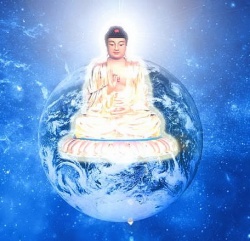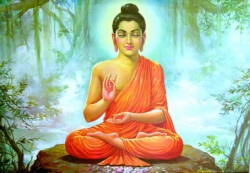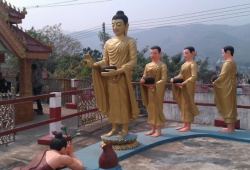Manual of Madhyamika - Reading Five: The Four Forces of Purification, Part Two
The following reading is taken from the Entry Point for Children of the Victorious Buddhas (rGyal-sras ‘jug-ngogs), a commentary by Gyaltsab Je Darma Rinchen (1364-1432) on the book called Guide to the Bodhisattva’s Way of Life (Byang-chubsems- dpa’i spyod-pa la ‘jug-pa) by Master Shantideva (c. 700 AD).
THE FORCE OF THE ANTIDOTE
Here next is our expanded explanation of the third of the four forces: the force of the activity of applying an antidote. Here there are two parts: the reason why it is fitting for you to make efforts in purifying yourself of your bad deeds, and why it is fitting to do so quickly. The first of these parts has itself two points: using the metaphor of a patient in order to demonstrate why you must purify yourself of your bad deeds quickly, and then using the metaphor of a cliff to demonstrate why you must purify yourself. The former of these contains three sections: setting forth the metaphor and what it refers to; a description of the very serious problems caused by the illness of the three poisons, and of the rarity of the medicine used to cure them; and finally why it is therefore appropriate to follow the advice of the supreme physician, the Teacher.
Even in a case where you’re endangered
By some normal illness, you must still
Follow the advice of a physician.
There’s no need to mention then
What you should do in the clutches
Of the disease of a thousand evils,
Of liking things and the rest.
Even in a case where you are endangered by some normal illness—that is, where the components such as wind or bile within your body are in a state of disturbance, and you have reason to fear that this might be fatal—you must still follow the advice of a physician, as a method for curing your disease. People like you and I though have been in the clutches of the greatest and most chronic disease of all, the three poisons of liking things and the rest, constantly, for time with no beginning. And these three are a disease which acts as the source for many thousands and millions of evils. If we would listen to the advice of a physician in the case of the normal disease, then there is no need to mention how fitting it would be for us to follow the antidote that has been prescribed for us by the highest of all physicians, by the victorious Buddhas, as an antidote for removing our sickness. Therefore it is fitting for us to make great efforts in applying the antidotes for negative deeds.
Even a single instance of these is enough
To waste all the human beings in our world,
And you will never find anywhere at all
Another medicine that can treat them.
Even a single instance of these deeds such as anger at a bodhisattva is enough to waste all the human beings living in our world; that is, to send them to the hells. Where then could you ever find an antidote, other than the holy words that impart teachings such as how to practice the path—where could you find any other medicine for treating these great harms? You could search everywhere, even in the realms of the worldly god named Pure One, or other such beings, but still never find another; and thus it is extremely rare.
The Omniscient One is a physician for this;
He’s given instructions for uprooting all pains,
Though we fail to follow and concentrate.
It’s incredibly ignorant, disgraceful.
Here is the third point. The Omniscient One is a physician for this illness; he is one who removes all of it, all the sickness of the mental afflictions, and who has spoken the instructions for uprooting all the pains of these afflictions. We though fail to follow these instructions, and concentrate on the causes that keep us in the cycle of life endlessly, that throw us to the lower realms. This is, as the text says, “incredibly ignorant,” meaning a situation which is disgraceful. As such you must, from the bottom of your heart, go for refuge in the Teacher, and practice the teachings of this Teacher in the proper way.
A person must be very cautious
Even of small, ordinary cliffs;
There is no need to say then
That we must take care around
Those many thousands of yojana high,
And where a fall means a very long time.
A person must be very cautious whenever there is any danger of falling even from one of those small, ordinary cliffs, the kind around a mountain or the like—the type of cliff where, if you fall off, all you can hurt is one of your arms or legs. There is no need to say then that you must be cautious about the kind of cliffs such as the one which is 32,000 yojana high [about 154,000 miles, or the distance at which the hell of No Respite is said to be located below the earth). This is what the expression “many thousands of yojana” is meant to represent; a special kind of cliff from which, once you fall, you must stay at the bottom for a very long time. This too is a reason why you must make efforts in applying the antidotes for the mental afflictions.
Here next is the discussion of why you must purify yourself quickly. This section has two parts of its own: instructions to make efforts in applying the antidotes to negative deeds, beginning today itself; and an explanation of why, since there is no reason at all that we can feel free of the threat of suffering, it is inappropriate to feel laziness about practicing the path.
It is not right to relax and think,
“I will never die right now, today;”
For without a doubt the time will come
When you have disappeared.
Here is the first of the two. You might think to yourself, “Admittedly I should make some efforts in applying the antidotes; but I think I will do so next month, or perhaps next year.” The correct thing to do though would be to start making efforts today itself, because it is not something right to simply live in laziness, and to relax without making any efforts towards the antidotes, thinking to oneself, “I will never die right now, today.” There is absolutely no certainty though that you will not die today, and we can fairly say that, without a doubt, the time that you have died and disappeared will come tomorrow. Thus you should stop this tendency to be lazy, and begin to make your efforts today itself.
It is just as the Epistle of Kanika states:
It’s no good thing for a human being
Ever to say, “I’ll do it tomorrow;”
The tomorrow when you are no longer here
Is a day that beyond any doubt will come.
Who was it that granted you the power not to fear?
How could you ever gain any certain freedom
That you would, beyond doubt, not disappear?
Why is it you sit there relaxed?
Here is the second point. You might then say, “Even if it’s true that we’re going to die, it’s no use to be afraid of it—there is no point to being frightened.” But you are here in the midst of the fear that comes from seeing and hearing of the deaths of everyone else, and the fear that you might fall into the lower realms. So who was it, what holy being, that blessed you and granted you the power not to fear: to say that, despite all this, there is “no point to being frightened,” no need to fear death, or your own bad deeds? The fact is that there is no being who could grant you any such power. So if you fail to make efforts towards applying the antidotes, then how could you ever gain any certain freedom from your negative deeds, and from death itself? You never could be free. And then when you died you would, beyond any doubt, disappear. So why is it that you fail to make any efforts in applying the antidotes, and why is it that you sit there, relaxed, lost to the effects of laziness? It is wrong to do so, and thus you should make every effort in practicing the path.
THE FORCE OF RESTRAINT
Next is our expanded explanation of the fourth of the four forces: the force of restraining yourself from bad deeds in the future. Here there are three parts: restraining yourself from negative actions because of your feelings of regret; purifying yourself of what you have already done; and pledging to restrain from negative actions, which is done once you have requested holy beings to listen to your resolution. There are two sections to the first of these parts: giving up bad deeds, which are meaningless; and making efforts, day and night, to practice the methods for freeing oneself from negative actions. The first section has two steps of its own: why being attached to your possessions is so inappropriate, since they are in no way reliable; and why it is wrong to be attached to relatives and the like. Here is the first.
All which you have enjoyed
Up to this point has fallen apart;
And what further do you have?
All because of your craving for these,
You’ve acted against your Lama’s wishes.
All of the possessions which you have enjoyed up to this point in the cycle of suffering have been unreliable; that is, they have fallen apart. And can we say that, among those possessions which you still have now, there are any further ones which have any essence? No, none at all. And yet, all because of your craving and attachment for these objects with no essence, you have acted against the wishes of your Lama, and committed negative deeds. You must feel regret for this.
You will give up this, that was
While you lived, and just so
With friends and relatives;
Then go on alone to who knows where.
Of what use then are any of
Your friends or enemies?
Here is the second point. You are going to have to give up everything: this body that you have here, while you are alive, and just so your friends and relatives as well. And then you will have to go on alone, to “who knows where;” that is, to a place which you cannot now know for sure. And so what is the use of any of your friends or enemies? They can be of no help at all, and thus it is wrong for you to feel any attachment for them.
Suffering comes from negative actions;
It is fitting that you spend all your time,
Day and night, devoted to only
This contemplation, and think to yourself:
“How can I gain definite freedom?”
Here next is the point about making efforts night and day. The suffering of the hells and the like all comes from negative actions such as taking life. As such it is fitting that you spend all your time, day and night, devoted only to this contemplation of good and bad deeds, of the principles of actions and their consequences, thinking to yourself, “How can I gain definite freedom from all these sufferings?” If you are unable to find with certainty, if you are unable to contemplate deep within your heart, the principles of actions and their consequences, then you will never be able to grasp with any certainty, with any of the kind of certainty which pleases the victorious Buddhas, any spiritual teaching at all.
Therefore it is right that you make great efforts in all these things. There are certain people who claim to have reached the point where they grasp emptiness clearly, and who still do not consider the principles of actions and their consequences to be of any importance. This is obviously a complete misunderstanding, and reflects a failure to grasp clearly the fact that emptiness is a reflection of dependent origination.
Deeds which are wrong by nature,
And deeds which are forbidden,
Any bad deed at all that you might
In dark ignorance, due to your failure
To grasp, ever committed at all.
Here next is the part about purifying yourself of what you have already done. We proceed in two steps, concerning the thing it is that you purify, and then the way in which you purify yourself of it. You are purifying yourself first of those deeds which are wrong by nature: those that are negative actions no matter who commits them; that is, regardless of whether the person in question is one with vows or not. And secondly there are the deeds which are wrong because the Buddha has forbidden them: those which are wrong only for those who have taken vows. What you are purifying yourself of is whichever of these you may have committed; in short, you are purifying yourself of any bad deed at all that you may ever have committed, out of your lack of understanding and your dark ignorance, your failure to grasp, the principles of actions and their consequences.
You stand here in the Protector’s direct presence,
Joining your palms at your breast,
And with a sense of fear for suffering
Prostrate, over and over again,
And thus undertake to purify
Yourself of all these.
To purify these deeds you stand here in the direct presence of the Protectors, before the Buddhas and their sons and daughters; you express yourself by joining your palms at your breast. In your thoughts you develop a sense of fear for suffering. And then you prostrate, over and over again, and undertake thus to purify yourself of all these negative actions.
The bad deeds I have committed, my Guides,
I ask you to consider mistakes.
They are nothing good, and from this moment on,
I’ll never commit any single one.
Next is the pledge to restrain ourselves. For this reason I make the following request to the Guides: “The bad deeds I have committed are mistakes, and I ask you to consider them mistakes. The bad things I have done are nothing good, and from this moment on, even at the cost of my life, I will never commit any single one of them at all, ever again.” By doing so we stop the flow of our bad deeds, and restrain ourselves from them again.
The teachings of the Buddha, and the commentaries upon them, present a great number of ways in which we can clean ourselves of our bad deeds. The one antidote which is totally complete though is this purification, this practice of using all four forces together to do the purifying. It is stated in a number of scriptures—for example, in the Blaze of Reasoning and in the Great Commentary to the Perfection of Wisdom in Eight Thousand Verses—that this practice can erase even those bad deeds which are definite to lead to the experience of a karmic result.
People like you and I have no great knowledge of the various laws of actions and their consequences. Even that very little bit which we do understand we are unable to put into practice as we should. Every single day then we commit negative actions in a great variety of different ways. Because of this we must follow the path of purifying ourselves of our bad deeds on a continual basis. And we should make efforts in the practice especially with the intention of purifying ourselves of those thoughts and actions which block us from being able to develop the true wish for enlightenment.
I was crushed by the mistake
Of being filled with the arrogance
Of deluded desire and jealousy,
And it kept me from reaching
The highest wish of all.
Before the Protectors then,
From the depths of my heart,
I confess every error
That I may have made
This is just a brief verse to summarize the chapter.
This concludes the second chapter
Of the Guide to the Bodhisattva’s Way of Life,
Entitled “Purifying oneself of negative deeds.”
Here lastly we cover the name of the chapter. This then is the explanation of the second chapter, the chapter on purifying oneself of negative deeds, from the “Entry Point for the Sons and Daughters of the Victorious Buddhas,” a commentary upon the Guide to the Bodhisattva’s Way of Life.
Here is the second major section, which is actually acquiring the wish for enlightenment, once you have already assembled the conducive conditions for its development: rejoicing in good deeds, and so on. This section has two parts, which are an explanation of the text of the chapter, and then a note on the name of the chapter. There are three steps to the first of these two parts: what to do for the preliminaries, for the main stage, and then for the conclusion. The preliminaries are five—rejoicing in good deeds; urging teachers to turn the wheel of the Dharma; requesting holy beings not to pass into “nirvana;” dedicating good deeds; and, as a step towards the practice of the perfection of wisdom, cultivating the state of mind in which we give up our bodies, our possessions, and the power of all the good we have done.
REJOICING
Rejoicing we will cover in three steps: rejoicing in those good deeds which act as a cause for birth in the higher realms, and in the result they cause; rejoicing in good deeds which act as a cause for freedom alone, and in the result they cause; and rejoicing in good deeds which act as a cause for unsurpassed enlightenment, and in the result which they cause.
I rejoice, with joy, in the virtuous deeds
Which relieve the torment of the lower realms
For every being; and in the fact
That these suffering beings could ever come
Here is the first of the three. I rejoice in the good deeds which act as a cause to help relieve the torment of the lower realms for every being in the cycle of suffering; and I rejoice as well in those which act as a cause for all of them to achieve a very special form of birth in the higher realms. I also rejoice in the result which these causes bring about: I rejoice in the fact that these suffering beings could ever come to live in the happiness of the higher realms. How do I rejoice? I think to myself, with thoughts of joy, about what a wonderful thing it is that these good deeds exist in the world.
I rejoice in their having collected together
Good deeds which act as enlightenment’s cause.
I rejoice in living beings’ certain freedom
From the sufferings of cyclic life.
Here is the second. I also rejoice in the fact that beings have collected together good deeds such as those which are consistent with reaching freedom: those deeds which act as a cause for the enlightenment of the listeners and self-made Buddhas. I rejoice as well in the result which these good deeds bring about: the certain freedom from the sufferings of cyclic life which living creatures can attain through these deeds—that is, I rejoice in the fact that they will achieve nirvana.
So too I rejoice in the enlightenment
Of those who protect, and in the levels
Of the sons and daughters.
I rejoice with gladness in the ocean
Of the goodness of the wish for enlightenment
Which brings every living being to happiness;
I rejoice too in what they undertake
To help all living kind.
Here is the third. So too I rejoice in the total enlightenment which has been reached by those who protect all other living beings; and in the ten levels which the different sons and daughters of the victorious Buddhas have attained. I rejoice as well in the causes for all these states, in the veritable ocean of the goodness of the wish for enlightenment: the thought to attain highest enlightenment in order to bring every living being to happiness. Beyond this I rejoice in the actual deeds of the beings with this wish: in the activities they undertake to help all living kind. I rejoice, with gladness, and I dwell in the faith of admiration, which is mixed in my mind with feelings of great happiness.
ASKING THE LAMAS TO TEACH
I join my palms at my breast and make
Supplication to all the Buddhas in every
Corner of the universe.
I request them to light the lamp of the Dharma
In order to illuminate every one
Of the living beings who wander confused
Here is the second. I think of all the Buddhas in every corner of the universe who have only recently achieved their Buddhahood, and who have yet to teach the Dharma. Physically I join my palms at my breast and, with great respect, make supplication to them. What is the goal of my supplication? I request them to light the lamp of the Dharma, of both the Dharma in the minds of people and the Dharma in the form of words, in order to illuminate the path which frees every living being from wandering confused in suffering and the darkness of ignorance.
ASKING THE LAMAS TO STAY
I join my palms at my breast and make
Supplication to those Victorious Ones
Who’ve determined to pass into “nirvana.”
I beg them not to leave behind
All these living beings so blind,
And to remain for countless eons.
Here is the third point. I also join my palms at my breast and make supplication to those Victorious Ones who have determined to pass on into “nirvana.” All these living beings are blinded—their eyes of wisdom are blinded—by ignorance, and I beg the Victors not to leave them in this condition: I ask them to remain for countless eons, so that they might remove from these beings the darkness of ignorance.
DEDICATION
There are four parts to the fourth point: dedication in general, dedication for the sake of the sick, dedication so that hunger and thirst may be removed, and dedication so that everything they ever wish for comes true.
Through performing all these activities,
Great goodness have I gathered.
I pray that, by this virtue,
The pain of every single living
Creature may be removed.
Here is the first of the four. I have gathered together a great deal of goodness through performing all these activities: through everything from making offerings on up to the supplication just mentioned. And I pray that, by this virtue, the pain of every single living creature may be removed.
I pray as well that I may become
The medicine, and the physician,
As well as nurses for all who are sick,
Until the day they are cured.
Here is the second. I pray as well that, through the power of these same acts of virtue, I may myself become the medicine, and the one great physician, and the nurses for all these sick living beings, until the day they are cured of their illness.
I pray that a shower of food and drink
May fall and that, when the intermediate eon
Of famine arrives, I may become
Food and drink as well.
Here is the third. I pray as well that there falls a shower of food and drink—that is, a whole variety of sustenance and refreshment—all with the power to remove every kind of harm in the form of hunger or thirst. There are three types of intermediate eons, and one of them is the intermediate eon of famine. I pray that, whenever this kind of eon arrives, I may become food and drink, and thus be able to remove the hunger and thirst of every living creature who needs me.
I pray that I may become myself
A great treasure house,
One that can never be exhausted,
For all living beings who are poor, and lack.
May I become too anything they need
Or want, an entire range
Of the different necessities for life,
And so appear to their very eyes.
Here is the fourth. I pray too that I may become a great treasure house, one that can never be exhausted, for all those living beings who are poor, and lack the things they need. I pray that I can become anything they need and want, an entire range of different necessities for life, and then appear before their very eyes, without any effort at all to make it happen.
See Also
- Manual of Madhyamika - Reading One: Author, Structure, and History of the Text
- Manual of Madhyamika - Reading Two: The Benefits of the Wish for Enlightenment
- Manual of Madhyamika - Reading Three: How to Make Offerings
- Manual of Madhyamika - Reading Four: The Four Forces of Purification, Part One
- Manual of Madhyamika - Reading Five: The Four Forces of Purification, Part Two
- Manual of Madhyamika - Reading Six: Taking Joy
- Manual of Madhyamika - Reading Seven: How to Fight the Mental Afflictions, Part One
- Manual of Madhyamika - Reading Eight: How to Fight the Mental Afflictions, Part Two
- Manual of Madhyamika - Reading Nine: Awareness
- Manual of Madhyamika - Reading Ten: The Perfections of Giving and Ethical Living







